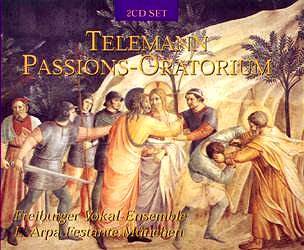In 1721 Telemann, possibly with the help of his friend
the poet Brockes, took up his appointment in the post of Musical
Director of the five major churches in Hamburg, responsible for
overseeing much of the city's music. The following year Telemann
revised his setting of Brockes' Passion, originally dating from
1716. This was a Passion Oratorio, written for concert performance
rather than church use. The story is narrated by the Evangelist
but he used a poetic paraphrase by Brockes rather than the gospel
text. The arias are sung by a mixture of allegorical figures and
the characters from the story. Jesus even gets a duet with his mother.
Also in 1722, Telemann wrote his own words for
another Passion Oratorio, 'Das selige Erwägen des bittern
Leidens und Sterbens Jesu Christi'. This became very popular and
received concert performances in Hamburg nearly every year from
1728 to the early 19th century. Telemann's text dispenses
with an Evangelist altogether. His soloists include Jesus, Caiaphas
and Peter alongside the allegorical figures of Der Glaube (Faith),
Die Andacht (Devotion) and Zion. The narration is carried forward
in recitatives sung by all of these.
Telemann's music is melodic and the arias are
in general quite short. This is a concert work, not a long meditative
religious devotion. It is quite short, lasting under two hours
(Handel's setting of the Brockes Passion lasts some 30 minutes
longer).
Devotionís first aria, a charmingly tuneful number
with flutes, is repeated after a recitative and choral, but with
slightly different words (a device that Handel uses for Jesus's
first aria in his Brockes Passion). And Petrus's first aria, the
A section of which is repeated for a second time after a short
recitative, is a rather bravura number sung by Stefan Dörr
with rather more bravura than accuracy though he spits out the
consonants superbly,
The orchestra includes flutes, chalumeaux, horns
and bassoons. Telemann uses them all to great effect in the arias.
The orchestration is one of the delights of this work. Each aria
seems to have its own particular timbre whether it is flutes and
piccolos (Devotion's 'Sollt ich deiner wohl vergessen'), a solo
bassoon (Devotion's 'Denke nach'), solo violins (Devotion's 'Ihr
blut'gen Schweissrubinen'), horns in Jesus's 'Wenn die Gerichtsopsaune'
and the wonderfully melancholy combination of low strings and
independent bassoon in Petrus's last aria ("Ach ach, was hab ich').
Telemann's light, imaginative orchestral touch along with his
frequent use of dance rhythms make this a most attractive work.
Its popularity is understandable.
The role of Devotion is shared between tenor
Zeger Vandersteene and soprano Barbara Locher. Barbara Locher
also sings the arias for Zion and Faith. Both the singers are
good, though in the more virtuoso passages Vendeersteene makes
up in swagger what he lacks in style. This tendency to bluster
is also a fault of Johan-Rene Schmidt, singing Caiaphas, though
he has a beautifully rich voice. Zion gets one of the most virtuoso
arias in the oratorio, 'Erstaunet', just after Jesus's death and
Barbara Locher makes the most of her opportunity. As Jesus, Berthold
Possemeyer gets rather more to do than in Bach's Passions. Here
he has five arias and when he is being thoughtful and melancholy,
Possemeyer makes a fine Jesus. Unfortunately his is not as convincing
in the more virtuoso passages, but these are relatively rare.
The choir has only chorales to sing, there are
no choruses or turbae. There are plenty of chorales, a total of
eleven including three versions of the Passion Chorale. The choir,
the Freiburger Vokalensemble, sing them with style and confidence.
The orchestra, L'Arpa Festante München,
playing on original instruments, relish all of Telemann's varied
orchestration and the wind players in particular contribute some
fine solos. Conductor Wolfgang Schäfer generally paces the
music well, though there were occasional moments where things
seem to plod a little. The recording has significant gaps after
each of the chorales, which also slows things up.
This seems to be the only recording of Telemann's
'Passion Oratorio' in the catalogue at the moment. Brilliant Classics
are to be congratulated yet again for their ongoing commitment
to making Telemann's music available. This is an entirely convincing
performance and the orchestra, in particular, contribute some
beautifully stylish playing. If the soloists are not all quite
perfect, they are all nevertheless more than capable. The resulting
performance is never less than adequate and frequently far more
than adequate.
There is no libretto, only a comprehensive track
listing. The story is self explanatory enough and does not really
need a detailed translation. The diction of the cast is excellent
so it is perfectly possible to follow the recitative if your German
is up to it.
Robert Hugill
